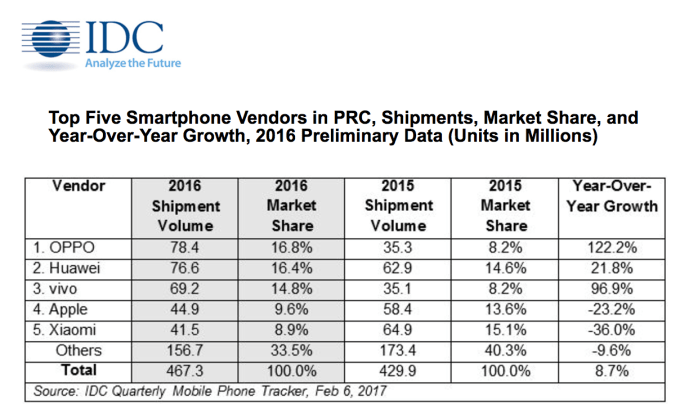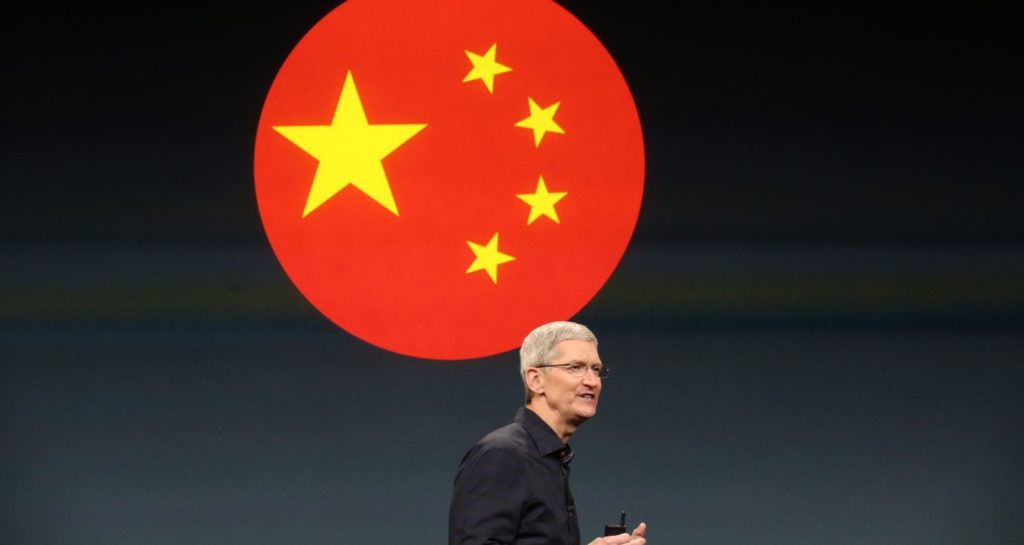Oppo is not a name that is anything like as familiar as Apple, Xiaomi or Huawei worldwide, but there’s further proof that it is most definitely one to watch, according the findings of a new report.
That’s because the little-known phone-maker scooped the top spot for smartphone sales in China last year, for the first time, fractionally beating out its sister company Vivo and heavyweight Huawei. Apple and Xiaomi, two massive names, meanwhile, posted their first annual shipment declines, highlighting the different struggles that both companies face in The Middle Kingdom.
Oppo and Vivo are both owned by Guangzhou-based company BBK, and they have steadily developed a strong presence in China, and markets like India and Southeast Asia. That’s through well designed phones that adopt new technology, like AMOLED screens, but are priced well below the iPhone. Most importantly, they use aggressive advertising campaigns and offline sales channels to reach prospective customers. All in all, the approach is similar to the tactics that have worked for Samsung.
A new report from IDC found that this strategy propelled Oppo’s annual sales in China to 78.4 million, up 122 percent year-on-year, first on the list, while Vivo sat slightly lower in third with 69.2 million shipments, up 97 percent. Sandwiched between the two is Huawei, with 76.6 million shipments. Apple and Xiaomi round out the top five.
According to IDC, Oppo and Vivo combined account for nearly one-third of the Chinese smartphone market, which is the world’s largest based on sales. That’s quite a staggering feat considering the competition — Samsung and Lenovo are among the many that didn’t make it into IDC’s tracker.

It was widely assumed that Xiaomi didn’t have a great 2016. The company declined to reveal annual sales figures for the first time, and its CEO acknowledged it had grown too quickly with expectations too lofty. IDC estimates its annual sales in China, which accounts for the bulk of its business, were down by nearly 10 percent. That suggests that Xiaomi’s 2016 total was well short of the 70 million-plus sales it carded in 2015.
But Xiaomi is looking to push itself forward in different ways now. CEO Lei Jun said last month that it will focus on expanding its retail footprint — perhaps inspired by the success of Vivo and Oppo — and IDC sees much merit there.
“There is no longer a single channel that is seeing exponential growth for smartphones unlike previous years. Most brands are now using a combination of channels to increase their shipments,” it added.
As for Apple, we know from its recent earnings that the company had another underwhelming quarter in China. iPhone sales declined 12 percent year-on-year during the period, in stark contrast to record sales numbers elsewhere in the world.
Despite its first annual decline in sales in China, according to IDC’s numbers, the analyst firm is positive about Apple’s position in the country. In its analysis, it argued that mid- and low-end smartphone firms like Oppo and Vivo haven’t stolen its marketshare, but instead existing Apple owners are waiting for a phone that is truly worth paying to upgrade.
“Most Apple users are expected to be holding out for the new iPhone that will be launched this year, and that will help the brand to see a growth in 2017,” IDC said. “Apple’s 10-year anniversary iPhone will also likely attract some of the high-end Android users in China to convert to an iPhone.”































Comment